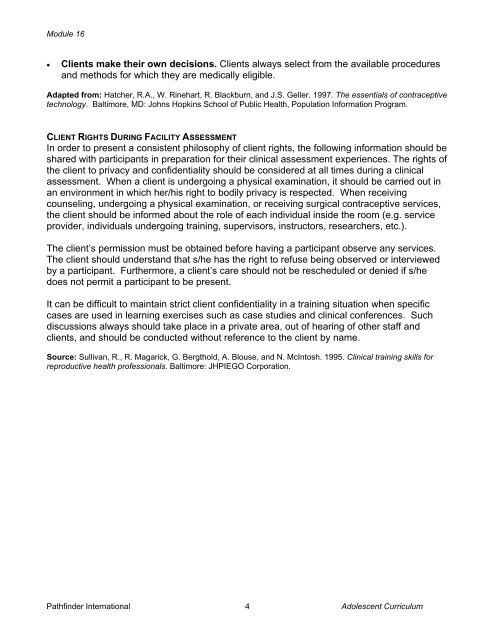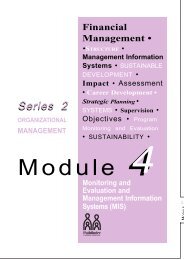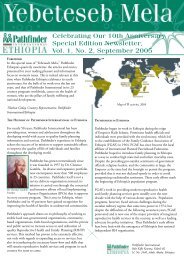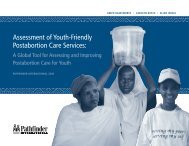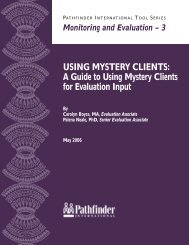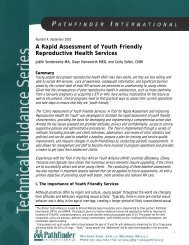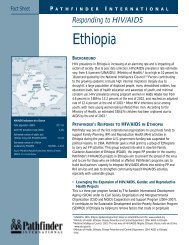- Page 1: Comprehensive Reproductive Health a
- Page 5 and 6: ACKNOWLEDGEMENTS The development of
- Page 7 and 8: Table of Contents Notes to the Trai
- Page 9 and 10: • 12.1: Percentage of Adolescents
- Page 11: Module 16 desirable. All clinic sta
- Page 15 and 16: INTRODUCTION Module 16/Introduction
- Page 17 and 18: Module 16/Introduction CONTENT Know
- Page 19 and 20: Module 16/Introduction CONTENT Know
- Page 21: Module 16/Introduction CONTENT Know
- Page 24 and 25: Module 16/Unit 1 MAJOR REFERENCES A
- Page 26 and 27: Module 16/Unit 1 Specific Objective
- Page 28 and 29: Module 16/Unit 1 CONTENT Knowledge/
- Page 30 and 31: Module 16/Unit 1 CONTENT Knowledge/
- Page 32 and 33: Module 16/Unit 1 Specific Objective
- Page 34 and 35: Module 16/Unit 1 CONTENT Knowledge/
- Page 37 and 38: Module 16/Unit 2 UNIT 2: ADOLESCENT
- Page 39 and 40: Module 16/Unit 2 Specific Objective
- Page 41 and 42: Module 16/Unit 2 CONTENT Knowledge/
- Page 43 and 44: Module 16/Unit 2 CONTENT Knowledge/
- Page 45 and 46: Module 16/Unit 2 CONTENT Knowledge/
- Page 47 and 48: UNIT 3: ADOLESCENT BEHAVIOR AND LIF
- Page 49 and 50: Module 16/Unit 3 WORK FOR TRAINERS
- Page 51 and 52: Module 16/Unit 3 CONTENT Knowledge/
- Page 53 and 54: Module 16/Unit 3 Specific Objective
- Page 55: Module 16/Unit 3 CONTENT Knowledge/
- Page 58 and 59: Module 16/Unit 4 • Value clarific
- Page 60 and 61: Module 16/Unit 4 Specific Objective
- Page 62 and 63:
Module 16/Unit 4 Specific Objective
- Page 64 and 65:
Module 16/Unit 4 CONTENT Knowledge/
- Page 66 and 67:
Module 16/Unit 4 Specific Objective
- Page 68 and 69:
Module 16/Unit 4 CONTENT Knowledge/
- Page 70 and 71:
Module 16/Unit 4 CONTENT Knowledge/
- Page 72 and 73:
Module 16/Unit 4 CONTENT Knowledge/
- Page 74 and 75:
Module 16/Unit 4 CONTENT Knowledge/
- Page 76 and 77:
Module 16/Unit 4 CONTENT Knowledge/
- Page 78 and 79:
Module 16/Unit 4 CONTENT Knowledge/
- Page 80 and 81:
Module 16/Unit 5 • Levenberg, P.,
- Page 82 and 83:
Module 16/Unit 5 CONTENT Knowledge/
- Page 84 and 85:
Module 16/Unit 5 CONTENT Knowledge/
- Page 86 and 87:
Module 16/Unit 5 Specific Objective
- Page 88 and 89:
Module 16/Unit 5 CONTENT Knowledge/
- Page 91 and 92:
Module 16/Unit 6 UNIT 6: SAFER SEX
- Page 93 and 94:
Module 16/Unit 6 Specific Objective
- Page 95 and 96:
Module 16/Unit 6 CONTENT Knowledge/
- Page 97 and 98:
Module 16/Unit 6 CONTENT Knowledge/
- Page 99 and 100:
Module 16/Unit 6 CONTENT Knowledge/
- Page 101 and 102:
Module 16/Unit 7 UNIT 7: CONTRACEPT
- Page 103 and 104:
Module 16/Unit 7 WORK FOR TRAINERS
- Page 105 and 106:
Module 16/Unit 7 CONTENT Knowledge/
- Page 107 and 108:
Module 16/Unit 7 Specific Objective
- Page 109 and 110:
Module 16/Unit 7 Specific Objective
- Page 111 and 112:
Module 16/Unit 7 Specific Objective
- Page 113 and 114:
Module 16/Unit 7 CONTENT Knowledge/
- Page 115 and 116:
UNIT 8: STI/HIV AND ADOLESCENTS Mod
- Page 117 and 118:
Module 16/Unit 8 WORK FOR TRAINERS
- Page 119 and 120:
Module 16/Unit 8 CONTENT Knowledge/
- Page 121 and 122:
Module 16/Unit 8 CONTENT Knowledge/
- Page 123 and 124:
Module 16/Unit 8 CONTENT Knowledge/
- Page 125 and 126:
Module 16/Unit 8 CONTENT Knowledge/
- Page 127 and 128:
Module 16/Unit 8 CONTENT Knowledge/
- Page 129 and 130:
Module 16/Unit 9 UNIT 9: COUNSELING
- Page 131 and 132:
Module 16/Unit 9 • Reflections
- Page 133 and 134:
Module 16/Unit 9 CONTENT Knowledge/
- Page 135 and 136:
Module 16/Unit 9 CONTENT Knowledge/
- Page 137 and 138:
Module 16/Unit 9 Specific Objective
- Page 139 and 140:
Module 16/Unit 9 CONTENT Knowledge/
- Page 141 and 142:
Module 16/Unit 9 CONTENT Knowledge/
- Page 143 and 144:
UNIT 10: SEXUAL IDENTITY AND ORIENT
- Page 145 and 146:
Module 16/Unit 10 WORK FOR TRAINERS
- Page 147 and 148:
Module 16/Unit 10 CONTENT Knowledge
- Page 149 and 150:
Module 16/Unit 10 CONTENT Knowledge
- Page 151 and 152:
UNIT 11: SEXUAL ABUSE Module 16/Uni
- Page 153 and 154:
Module 16/Unit 11 RESOURCE REQUIREM
- Page 155 and 156:
Module 16/Unit 11 CONTENT Knowledge
- Page 157 and 158:
Module 16/Unit 11 CONTENT Knowledge
- Page 159 and 160:
Module 16/Unit 11 CONTENT Knowledge
- Page 161 and 162:
Module 16/Unit 11 Specific objectiv
- Page 163 and 164:
Module 16/Unit 11 CONTENT Knowledge
- Page 165 and 166:
Module 16/Unit 11 CONTENT Knowledge
- Page 167 and 168:
Module 16/Unit 11 CONTENT Knowledge
- Page 169 and 170:
Module 16/Unit 12 UNIT 12: PREGNANC
- Page 171 and 172:
Module 16/Unit 12 EVALUATION METHOD
- Page 173 and 174:
Module 16/Unit 12 CONTENT Knowledge
- Page 175 and 176:
Module 16/Unit 12 CONTENT Knowledge
- Page 177 and 178:
Module 16/Unit 12 Specific Objectiv
- Page 179 and 180:
Module 16/Unit 12 CONTENT Knowledge
- Page 181 and 182:
Module 16/Unit 12 CONTENT Knowledge
- Page 183 and 184:
Module 16/Unit 12 CONTENT Knowledge
- Page 185 and 186:
Module 16/Unit 12 CONTENT Knowledge
- Page 187 and 188:
Module 16/Unit 12 CONTENT Knowledge
- Page 189 and 190:
Specific Objective #4: Discuss pare
- Page 191 and 192:
Module 16/Unit 12 PARENTING CONTENT
- Page 193 and 194:
Module 16/Unit 12 CONTENT Knowledge
- Page 195 and 196:
Module 16/Unit 12 CONTENT Knowledge
- Page 197 and 198:
UNIT 13: PROVIDING ADOLESCENT SERVI
- Page 199 and 200:
Module 16/Unit 13 WORK FOR TRAINERS
- Page 201 and 202:
Module 16/Unit 13 CONTENT Knowledge
- Page 203 and 204:
Module 16/Unit 13 − − − −
- Page 205 and 206:
Module 16/Unit 13 CONTENT Knowledge
- Page 207 and 208:
Module 16/Transparencies Transparen
- Page 209 and 210:
Module 16/Transparencies Transparen
- Page 211 and 212:
Transparency 4.1: Types of Question
- Page 213 and 214:
Module 16/Transparencies Transparen
- Page 215 and 216:
Module 16/Transparencies Transparen
- Page 217 and 218:
Trainer's Tools 0.1: Pre-Test Answe
- Page 219 and 220:
Module 16/Trainer's Tools 12. Which
- Page 221 and 222:
Module 16/Trainer's Tools Trainer's
- Page 223 and 224:
Module 16/Trainer's Tools Trainer's
- Page 225 and 226:
Module 16/Trainer's Tools lifestyle
- Page 227 and 228:
Module 16/Trainer's Tools Country P
- Page 229 and 230:
Module 16/Trainer's Tools Trainer's
- Page 231 and 232:
Trainer's Tool 11.1: Sexual Abuse T
- Page 233 and 234:
Module 16/Trainer's Tools Trainer's
- Page 235 and 236:
Time constraints. Trainer's Tool 11
- Page 237 and 238:
Module 16 List of Acronyms AIDS ARH
- Page 239 and 240:
Module 16/Bibliography Major Refere
- Page 241 and 242:
Module 16/Bibliography • Hunter-G
- Page 243 and 244:
Module 16/Bibliography • Populati


